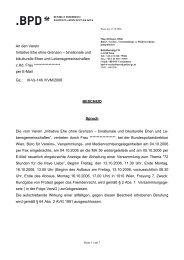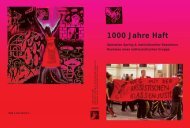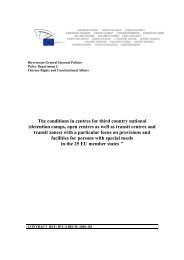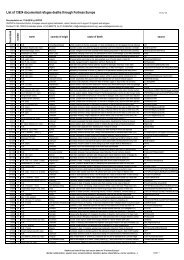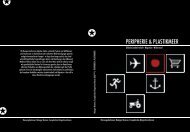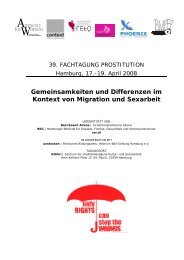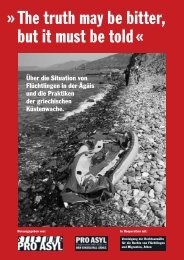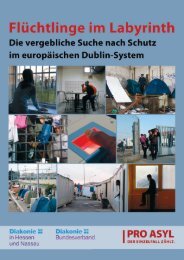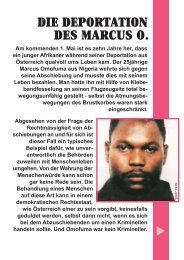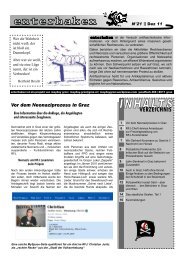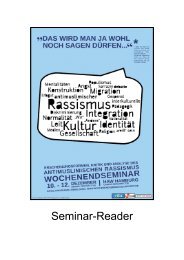Turin's CIE - International University College of Turin
Turin's CIE - International University College of Turin
Turin's CIE - International University College of Turin
Create successful ePaper yourself
Turn your PDF publications into a flip-book with our unique Google optimized e-Paper software.
detainees are completely dependent on the staff at a time when their lives are extremely<br />
stressful and uncertain. As one detainee noted:<br />
“[M]aybe the worst thing for me is that if you do not make a racket, nobody comes and<br />
nobody cares. Then, I don’t understand why if their aim is to send people back to their<br />
home countries, they don’t do it immediately. I can understand it may take one or two<br />
months to organise the repatriation, but no more than that. You cannot keep people who<br />
did nothing locked in a cage without telling them for how long. One month and then<br />
another one and then another one and you will never know when this torture will finish.<br />
And you don’t know how it will finish. But at a certain point most <strong>of</strong> the people here only<br />
want to go out and go back to their country. If they don’t have a family here, they just want<br />
to leave Italy” (Interview 18).<br />
However, some interviewees seemed to believe that problems between the staff and detainees<br />
stemmed from the detainees themselves 88 . Questions were raised about whether the <strong>CIE</strong> staff<br />
are sufficiently trained and capable <strong>of</strong> dealing with the volatile situation inside the <strong>CIE</strong>:<br />
“I’ve noticed a level <strong>of</strong> complete ignorance among the staff [Red Cross and military staff].<br />
When there are moments <strong>of</strong> tension they are not solved or calmed down at all. There is a<br />
lack <strong>of</strong> respect: in the first place from the military personnel, but respect is also missing<br />
from the Red Cross. There is a lack <strong>of</strong> pr<strong>of</strong>essionalism, there are no rules and the staff are<br />
not prepared for what they are asked to do” (Interview 8).<br />
Allegations were even raised about violence at the <strong>CIE</strong>, specifically about the role <strong>of</strong> the Guardia<br />
di Finanza and the Carabinieri military police corps 89 . Perhaps the following poignant words can<br />
best express the current state <strong>of</strong> affairs in <strong><strong>Turin</strong>'s</strong> <strong>CIE</strong>: “Here they are doing something really<br />
wrong because we have not been arrested for criminal matters! We are called “guests” so we<br />
should be treated as guests - not as animals” (Interview 15).<br />
2. VIOLENCE<br />
An endemic problem at the <strong>CIE</strong> concerns the manner in which the staff and security personnel<br />
behave. While two detainees alleged physical violence, a frequent refrain from the detainees<br />
was the uncaring manner in which the personnel conducted themselves 90 . The two detainees<br />
who alleged violence explained it in the following terms:<br />
“They laugh about us, they bother us. It also happened a few days ago. I asked to see the<br />
doctor as I’ve been on a hunger strike for eight days. They put me inside a cell, I told them I<br />
couldn’t stay there because I couldn’t stay alone and it was cold but they pushed me inside<br />
and wanted to hit me with a truncheon” (Interview 14);<br />
but he wanted to go back to his country because he had been inside <strong>CIE</strong> for three months. But they did not want<br />
to send him back to his home country, so he cut his veins - in a horrible way in front <strong>of</strong> them [<strong>CIE</strong><br />
staff/military]. Nobody intervened” (Interview 15).<br />
88 “It's very subjective. Some detainees appreciate very much the work <strong>of</strong> the Red Cross staff, they recognise<br />
they do a lot. But people working inside <strong>CIE</strong>, including guards, change quite <strong>of</strong>ten. [….] <strong>CIE</strong> staff treat female<br />
detainees in a more gentle way than male detainees, maybe because they are considered less violent and less<br />
dangerous than men” (Interview 8).<br />
89 See the next section: Part B. Conditions <strong>of</strong> Detention, Chapter VI. Relationships with <strong>CIE</strong> staff, 2. Violence.<br />
90 “Nothing. They do not intervene. And it is not necessary to call the Red Cross or the guards. There are<br />
cameras: they immediately notice when tensions rise up and we start fighting. They come closer and they stay<br />
there, outside the cage, staring at us while we are fighting” (Interview 18).<br />
53 | P a g e




